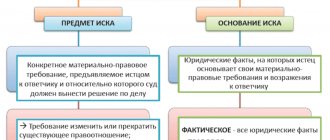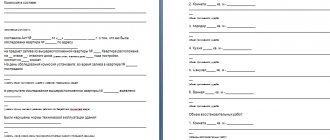The forced eviction procedure can only be carried out after the court makes an appropriate decision. When going to court, you must competently draw up a claim for eviction; it is accepted only in writing.
To draw up a claim, existing legal requirements must be taken into account.
An incorrectly drafted application will not be accepted by the court and will require revision. To avoid returns, you can contact a qualified specialist who will help you competently draw up a claim or independently study the established rules and only then write a statement. When taking an independent approach, it is important to focus on professionally compiled sample forms.
Judicial procedure for eviction
It is difficult to evict citizens who are registered or do not have a residence permit. This process affects not only moral aspects, but also purely material ones. The owner has many reasons to ask the citizens living in his living space to vacate it. The grounds may be legal, that is, provided for by the Civil and Housing Code, or groundless. In a peaceful settlement of a conflict, the presence or absence of reasons makes no difference - the owner notifies of his decision, and the tenant moves to another place and changes his registration address.
The reluctance of a resident citizen to liberate the territory takes the conflict to a different plane – coercive. You can’t just kick someone out against their will; this can only be done through the courts. This procedure involves a complex and multi-stage scheme, the result of which is not always clear.
A judicial eviction involves the property owner going to court to evict a tenant from their property. The applicant is obliged not only to draw up a claim, but also to confirm his package of documents, as well as pay the state fee for consideration of his case. Subsequently, the court will consider the legality of such an action and, if the grounds are proven, a decision will be made to deprive the resident of the right to further stay in the premises.
Registration and registration
Legal norms regarding registration have existed in Russia for a long time. But these days, the term “registration” is often used together with this term. Basically, their use is determined by the time of residence of a person in a specified place. Subscription usually means registration at a permanent place of residence.
APPLICATIONS AND CALLS ARE ACCEPTED 24/7 and 7 days a week.
It's fast and FREE !
–>
Registration usually concerns issues of temporary residence. It is used when a person receives the right to temporarily use residential premises.
Statement of claim
The statement of claim is the most important document for the plaintiff. It is this that allows you to formally apply to the court with a request to consider a conflict situation.
Statements of claim are drawn up according to a special scheme. These documents contain several blocks:
- Introductory.
- Descriptive.
- Motivational.
- Resolute.
Claims should include step by step:
- Required details. This part consists of information about all parties that will take part in the trial, usually there are at least three of them - the court, the plaintiff, the defendant, but there may be more.
- Subject of conflict.
- Grounds to require the defendant to perform the specified actions.
- Applicant's requirements.
In addition, the statement of claim usually contains references to legislative norms, a list of documentation attached to it and allowing one to prove the stated.
Required details
The statement of claim is written by hand or typed on a computer, both options are accepted by the court. It is important to maintain the chronological order of entering data and correctly arrange the main blocks on a blank sheet of paper.
Claims are stated as standard on an A4 sheet. In the upper right corner there is an introductory part, which contains the main details of the document, namely to whom and from whom the application is being submitted. The introductory information consists of the following blocks:
- The name of the court and the address where it is located. Claims should be filed at the location of the property from which the tenant is being evicted.
- Full name of the plaintiff, his registration and/or residence address. Here you can specify contact numbers, e-mail, fax.
- Full name of the defendant, his residential address.
It is important that the indicated addresses reflect the actual location of the parties. Subsequently, all court documents will be sent to them - information about the filed claim, and subsequently the court decision.
Item
Article 131 of the Civil Procedure Code of the Russian Federation describes the requirements for drawing up statements of claim. In particular, paragraph 4 requires the statement to indicate the essence of the violation, which is actually the subject of the claim. In general cases, the subject of a claim may be an identified violation of human rights, freedom or legitimate interests. When drafting a judicial application, this determination refers to what the plaintiff is asking for a decision to be made.
The subject of the claim in the eviction of citizens illegally living in a residential premises is the applicant’s right to reside, use and dispose of his property, and the defendant is accordingly obliged to vacate the living space. To fully clarify the legal relationship between the plaintiff and the defendant, it is necessary to provide the following information in the text of the application:
- Data on the disputed real estate.
- Information about the legal ownership of the property and on what basis the plaintiff acquired it. It should be indicated when and how the living space was received - a purchase and sale agreement, donation, exchange or privatization of the premises.
- A list of citizens registered in the premises and the degree of their relationship to the owner.
It should be remembered that, despite the right of ownership, there must be sufficient grounds to evict a resident. For example, it is not always possible to evict a family member; this is usually done in case of divorce and loss of this status.
Base
The grounds for eviction are the most important part of the claim.
If they are insufficient or unfounded, it is quite easy to lose in court proceedings and be left without satisfaction of your claims.
You can evict a resident for the following reasons:
- Dissolution of marriage, as a result of which the former spouse loses the status of a family member and, therefore, is deprived of the right to live together. The exception is situations where the apartment was purchased during marriage or privatized jointly.
- Expiration of the lease agreement.
- Violation of the requirements established by the Housing Code.
- Change of owner of the living space.
In the statement of claim, the plaintiff sets out the grounds as follows:
- The circumstances that gave rise to the filing of the claim, that is, the tenant’s reluctance to vacate the territory.
- List of reasons for vacating living space.
- Confirmation of the validity of the eviction (tenancy agreement, certificates from the housing department, statements from personal accounts, if we are talking about non-payment of housing and communal services, reports of inspection of the premises and statements of identified violations in the maintenance of housing, etc.).
The claim should also indicate that the owner made attempts to peacefully resolve the conflict. The fact of a pre-trial resolution of the dispute must be confirmed by written notification and documents confirming its receipt by the defendant.
Requirements
The applicant must decide on the requirements before he begins to draw up a statement of claim. The plaintiff can apply to the court with one claim or several at once. When it comes to the eviction of living citizens, the requirement is expressed as follows - to remove the tenant from the registration register and evict him from the specified premises. In addition, the owner may also submit demands for the need to recover a certain amount of financial resources if:
- The resident owes the owner rent for the premises.
- Housing and utility bills were not paid.
- The owner's property was damaged.
Each fact is confirmed by documents, and the amount must be real and justified.
When presenting a request for eviction, you should clearly indicate the address of the living space from where it should be carried out. This clarification will not allow for double interpretation of what is stated on paper, and therefore will not become a reason for incorrect interpretation.
Termination of the right to use residential premises
The right to use residential premises arises for various reasons, including:
- Provision by the owner of residential premises on the basis of clause 2 of Art. 30 of the Housing Code of the Russian Federation the right for members of his family to live in the apartment . The owner of an apartment can move all members of his family into it only on the basis that they are relatives.
- Testamentary refusal . Based on paragraph 1 of Art. 33 of the Housing Code of the Russian Federation, any testator may in his will make it a condition for receiving the inheritance of residential premises that a person who is not an heir will live in it for life. For example, a father leaves an apartment to his son with the condition that his sister will remain living in the apartment for life.
- Contract for the sale and purchase of residential premises . The new owner of the apartment receives the right to use it immediately after signing the contract and transferring funds to the seller.
- Lifetime maintenance agreement . According to Art. 34 of the Housing Code of the Russian Federation, the owner of a residential premises can conclude a lifelong maintenance agreement with dependents with any citizen of the Russian Federation. On the basis of such an agreement, the owner of the apartment transfers ownership of his residential premises, but the citizen who received the housing is obliged to support the former owner who transferred the apartment to him for life.
- Lease contract . The owner enters into a lease agreement with the tenant, on the basis of which the tenant receives the right to use the residential premises for living.
The grounds for the right to use an apartment or house are living in residential premises as:
- owner (realization of property rights);
- the tenant (under the terms of the lease);
- family member (with the consent of the owner or tenant).
A citizen who has lost this right is obliged to leave the residential property, since he can no longer stay there and use it as housing. At the same time, the period by which he must move out is stipulated by the owner and cannot be disputed.
Drawing up a document
Drawing up a claim requires care, responsibility and legal literacy. You cannot take a sample and rewrite it by substituting your own data, because each situation is individual, which means the approach to presentation will be unique.
Lawyers offer their paid services for drawing up statements of claim. By turning to them for help, the plaintiff gains time that he would have spent on independently studying the issue and drawing up a claim.
In addition, a qualified specialist, in addition to purely technical execution, will provide consultation on the issue of interest and tell you which facts should be emphasized the most, how to properly support the evidence base, which articles of the law to operate in order to increase your chances of a positive outcome of the case. But it is also possible to independently resolve the issue of writing a claim; to do this, you should carefully read the information presented in this text and use it.
On one's own
To independently draw up a statement of claim, the owner of the living space should pay attention to several important things:
- The first thing he needs to start with is to study the law that regulates this aspect of legal relations. If you want to evict a citizen, you should first of all look at the Housing Code. Its articles regulate the grounds for such action. However, one regulatory act will not be enough. In most cases, the applicant cannot do without the articles of the Civil, and in some cases, the Family Code. Having a personal computer and Internet access greatly simplifies the process of finding the necessary information.
- Pay close attention to Chapter 12 of the Code of Civil Procedure of the Russian Federation, which sets out in detail the rules for preparing and filing claims in court.
- Study completed samples of such statements of claim.
- Take an interest in the judicial practice that has developed to date in similar cases.
It is recommended to start drawing up a claim only after a package of documentation has been completed that proves the validity of the claims. The absence of such papers will negate the procedure itself.
Lawyer or barrister
Contacting a lawyer who specializes in housing issues or an attorney will make things much easier for the applicant. He will not have to study the law himself and become an expert in litigation. A hired lawyer will allow the plaintiff:
- Draw up a claim quickly and competently. As a rule, claims drawn up by professionals are not returned for revision by the court secretariat.
- Explain legal aspects.
- Identify weak points in the requirements and strengthen them or turn the situation around in a different way, beneficial, first of all, for the applicant himself.
- Complete the documentation package.
The services of a lawyer or attorney may be limited to just writing a document, but it would be much better to receive a comprehensive service that includes a detailed consultation.
The only serious disadvantage of contacting a lawyer is the cost of his services. Moreover, the cost can vary over a fairly wide range depending on the complexity of the case and the professionalism of the specialist himself.
Who can initiate the process
Individuals or legal entities, as well as their authorized representatives, can initiate filing a claim with the judicial authorities.
APPLICATIONS AND CALLS ARE ACCEPTED 24/7 and 7 days a week.
It's fast and FREE !
–>
To act as a plaintiff in a civil case, you must meet the following requirements:
- For individuals:
- availability of full legal capacity (except for applications for recognition of legal capacity);
- reaching the age of majority (except for applications for emancipation);
- For legal entities: availability of a certificate of state registration.
If the plaintiff uses the services of a proxy, his rights must be formally formalized by a notary in the form of an appropriate power of attorney.
Attachments to the claim
Claims are considered justified if they are supported by documents.
When preparing a statement, great attention is paid to this aspect; moreover, you should first collect the evidence base, and only then, on its basis, draw up the text of the claim.
Applications to the requirements in one form or another may include:
- Identity card of the plaintiff, and if this is a legal entity, then documents for the company will be required.
- Title papers that confirm that the applicant has legal rights to the requested living space. This could be a purchase and sale agreement, an exchange, a gift, a privatization certificate or a deed of gift.
- Extract from the Unified State Register of Real Estate.
- An extract from the household register about the number of registered persons; the list must also indicate the defendant, if he is registered at the place of residence.
- Receipt of paid state duty.
In addition to the mandatory list of papers, you will also need to collect an additional one. It includes forms that confirm the grounds for eviction specified in the claim. It could be:
- Divorce certificate.
- Police reports on administrative offenses.
- Testimony from neighbors.
- Premises inspection reports.
- Other documents.
All documents are provided in copies, except for the receipt of payment of the state duty.
Submission to court
Drawing up an application and collecting documentary evidence is a preliminary stage of the procedure - preparation for the first step. After the preparatory process is completed, all that remains is to complete the papers correctly. According to the rules, the applicant submits several identical sets of documents. Their number is determined by the number of participants in the process. In most cases, the number of sets is three:
- One court.
- The second is for the defendant.
- The third is to the plaintiff himself.
All sets consist of a claim and copies of attached documents. A receipt for payment of the state fee is attached only to the list for the court.
Before filing an application, you should clarify the jurisdiction of eviction cases and their jurisdiction.
Jurisdiction
When a civilian goes to court with demands to evict a citizen living on the plaintiff’s territory, it is necessary to clearly understand to which court the statement of claim can be filed. The norms of jurisdiction are established in Article 22 of the Code of Civil Procedure of the Russian Federation. According to this article, courts have the right to consider applications for eviction of tenants filed by civilians. Disputes are resolved in which citizens, representatives of organizations and government bodies take part when it comes to the violation of the rights of an individual or the interests of a group of people.
Demands for the protection of violated housing rights should be submitted in accordance with the jurisdiction of cases, which is regulated by the Code of Civil Procedure of the Russian Federation. Requests for eviction from your own or municipal real estate are considered after filing a statement of claim, complete with supporting documentation. Claims are accepted from interested parties or at the request of the prosecutor.
Jurisdiction
The issue of jurisdiction over eviction applications is extremely important, since by applying to the wrong authority, the applicant will be refused to accept documents and consider the case. There is a strict gradation that determines in which case and where to apply. The price of the claim plays a significant role in the division of jurisdiction. If the requirements are of a material nature, then it is important to determine the amount of its cost, which may also affect the jurisdiction of the case.
When a marriage is dissolved, demands for divorce, division of property, place of residence for children, and eviction of the former spouse may be submitted to the court. It is impossible to combine all the requirements into one and submit them for consideration to one authority. Several different statements will need to be made. When you evict a tenant and want to demand monetary compensation from him for unpaid utilities or the amount of rent for the premises, theoretically, two claims are prepared: one in a court of general jurisdiction, and the second in an arbitration court. But Article 22 of the Code of Civil Procedure of the Russian Federation allows both material and non-material claims to be considered in an instance of general jurisdiction.
Eviction cases fall under the jurisdiction of district or city courts. Please note that you should apply at the location of the living space, and not at the registration of the defendant, as in most cases.
We should not forget about the Supreme Court, which controls the activities of all authorities in general and where you can file applications for the expulsion of residents if the issue has not been resolved in organizations of general jurisdiction.
✅ Legal assistance
A statement of claim for eviction from an apartment is only a small part of what is required from the plaintiff. The applicant must provide sufficient evidence to support his case. The defendant will not be evicted if you do not argue your position and refer to legal norms. Judges are very scrupulous in matters of eviction, so even the simplest cases are considered with bias. Not to mention disputes involving minor children or disabled people. Lack of skills to participate in the legal process can make it difficult to evict an apartment. Or it will seriously delay the process.
Take advantage of a free consultation with our lawyers.
All specialists are not just professionals in their field, but also practicing lawyers. Our experts are ready to help you with your eviction proceedings. Experts will tell you what to include in the statement of claim, tell you about the documents and select judicial practice. Legal assistance will relieve you of fears before a court hearing. Contact us at any time convenient for you - we will advise! Attention!
- Due to frequent changes in legislation, information sometimes becomes outdated faster than we can update it on the website.
- All cases are very individual and depend on many factors. Basic information does not guarantee a solution to your specific problems.
That's why FREE expert consultants work for you around the clock!
- via the form (below), or via online chat
- Call the hotline:
- 8(800)302-39-65
— All residents of the Russian Federation - +7(495)128-69-80
— Moscow and the Region - +7(812)509-13-65
— St. Petersburg and region
- FREE for a lawyer!
By submitting data you agree to the Consent to PD Processing, PD Processing Policy and User Agreement.
Anonymously
Information about you will not be disclosed
Fast
Fill out the form and a lawyer will contact you within 5 minutes
Tell your friends
Rate ( 5 ratings, average: 4.20 out of 5)
Author of the article
Maxim Privalov
Lawyer. 2 years of experience. I specialize in civil disputes in the field of housing and family law.
Author's rating
Articles written
614
Trial in court
Registration of a statement of claim with the secretariat of a court of general jurisdiction indicates that the first stage has been completed. From this moment on, the applicant can only wait for the hearing to take place. Typically, documents are reviewed within 30 days from the date of submission; this is the deadline; it can be significantly reduced. After a preliminary examination of the case, a date for trial is set, of which the parties are notified in writing.
The presence of the parties is considered mandatory, but even their justified or unjustified absence will allow the process to proceed and a decision to be made. If you want to defend your interests as much as possible, you should not neglect attending the meeting. If new circumstances arise, the consideration may be postponed or extended, but the result is still a court decision. It can be challenged in accordance with the established procedure.
Judgment
The climax of the meeting is the issuance of a court decision. It may satisfy the plaintiff's claims in whole or in part or refuse them. A decision announced orally comes into full force only after 30 days. This time is given to the parties to file an appeal. The decision of a court of general jurisdiction is not unshakable; it can be challenged by any party in higher authorities. If this right has not been used, then after this period the court decision is printed on paper and sent by mail to the plaintiff and defendant. To speed up the procedure for obtaining it, you can request it in person by appearing in court after the end of the specified period.
A court decision printed on paper is the basis for deregistering a tenant and initiating enforcement proceedings to evict tenants who are no longer registered in a given territory and have lost the right to reside in the specified living space.
✅ Who can't be evicted?
Legislation carefully protects the rights of certain categories of citizens. Even if there are good reasons for eviction, the court will deny such a right.
Who cannot face forced eviction from a municipal apartment:
- minor children are under the protection of the guardianship and trusteeship authorities (CCA);
- poor citizens - if they have problems buying (renting) new housing;
- pensioners, disabled people of groups I-II, WWII veterans;
- orphans - in case of eviction, they must be provided with housing with conditions no worse than the current ones (clause 4 of article 292 of the Civil Code of the Russian Federation).
Social services ensure that the rights of these residents are fully respected. Even if eviction happens, the poor will not be left without alternative housing at the expense of the state.










